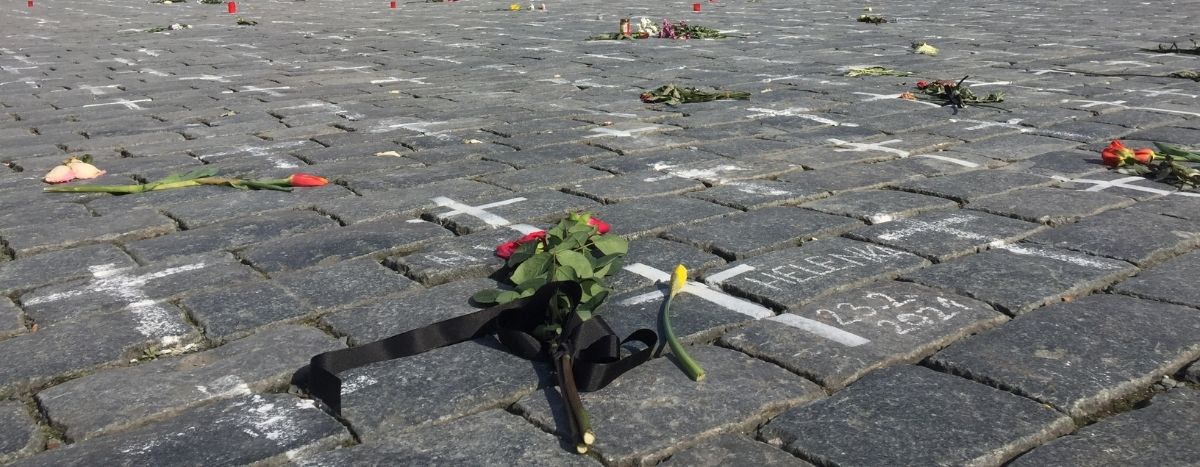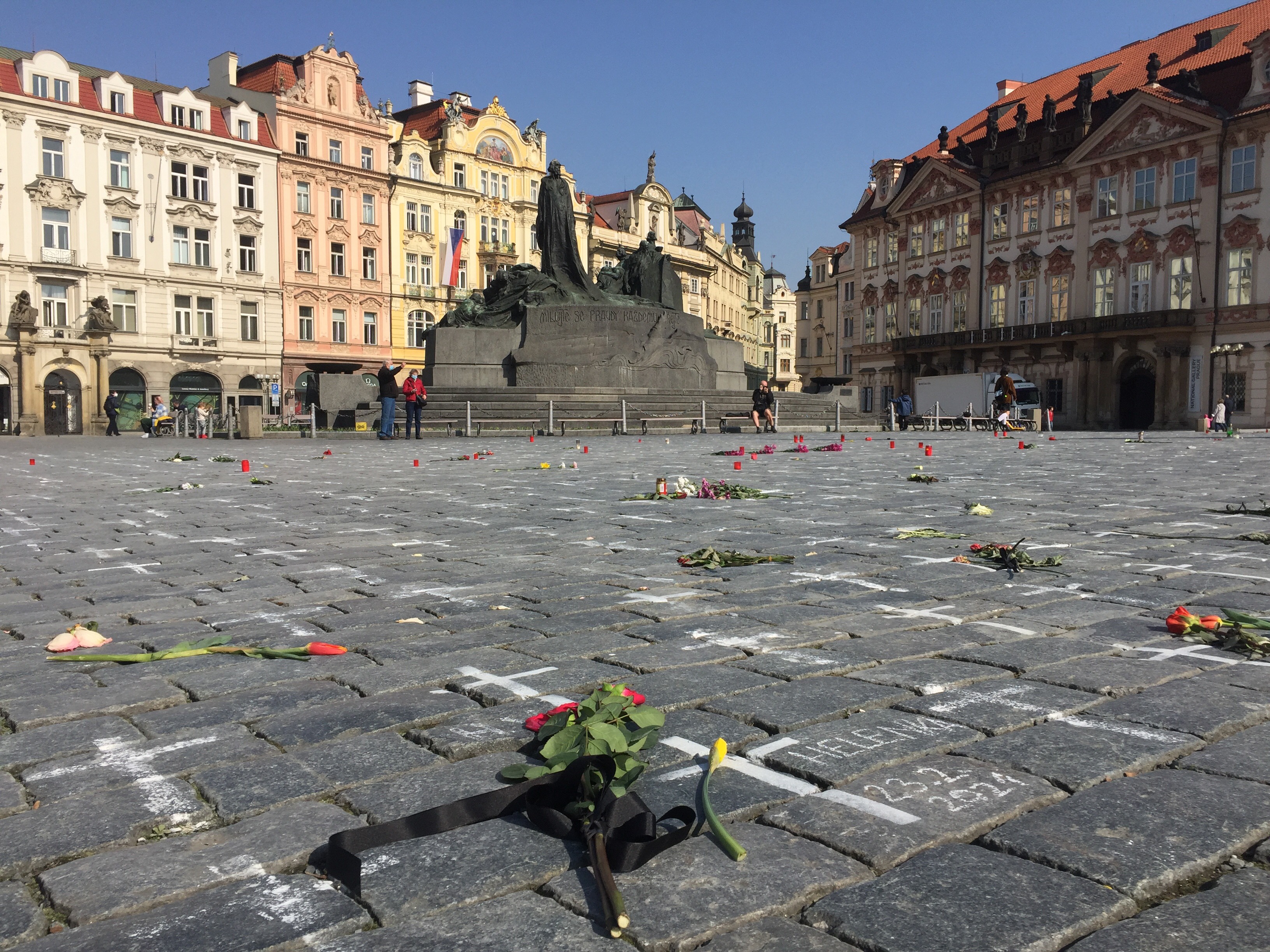
Czechia: the pandemic is no excuse to undermine democracy
Published on
Populist leader Andrej Babiš has exploited the Covid-19 emergency in order to attack public institutions. We spoke to Jiří-Jakub Zévl, co-founder of the NGO 'Million Moments For Democracy', about the situation in Czechia and how civil society activists in Prague are finding new, innovative ways to protest.
What is Million Moments For Democracy (Czech: “Milion chvilek pro demokracii”)?
Million Moments for Democracy is a political NGO, which is not in fact a ‘nongovernmental’ organization but rather an ‘anti-governmental organization!’ We founded it in reaction to the last elections in 2017, when the centre-right political party ANO (Action of Dissatisfied Citizens) won a huge share of the vote. There was a high probability that their leader, Mr Andrej Babiš, at the time the country’s second-richest businessman, would become the next Prime Minister. We saw him as representing a very serious threat to democracy. First of all, he is an oligarch - which is not automatically wrong, this is not about hate towards rich people, not at all - but his personal past does present some issues. He was an agent of the secret police during the communist regime, aka the most powerful instrument of the totalitarian state. More than 30 years after the revolution, this is simply unacceptable. The other major problem is that nobody really knows how he got his money. Babiš is the head of an enterprise called Agrofert which journalists have linked to mafia activities. Finally, his party doesn't really follow democratic principles. He basically owns it.
Does this mean that the political landscape was more acceptable or more democratic prior to 2017?
I don’t really see a correlation between the founding of Million Moments for Democracy and politics being democratic or not. I’m 26 now, so four years ago I was quite young. I was still finishing my bachelor's degree. I wouldn't really say that I accepted things as they were before but, yes, it was much better. During the previous government, when Babiš’s party was part of the coalition, there were at least democratic principles in place. I had lots of criticisms of the previous government, but it was still a pluralistic environment. The last elections really changed that.
At the beginning of March, activists from Million Moments for Democracy painted 25,000 crosses on the ground in honour of the Czech victims of Covid-19. Why?
Since the pandemic began we’ve wanted to be as active as possible, but we didn't want to physically demonstrate as we had before. We wanted to show our disagreement with the government in a different way. Although they took some valid steps, in my opinion a lot of other things have been pushed through in the shadow of the coronavirus. We wanted to criticize those things, so we organized online protests, protests in cars, events using lasers…. this was another way for us to denounce the government’s culpability.

I'm not saying they are responsible for all the deaths – of course we see all the casualties around the world. Yet we do think that the way the government managed the pandemic has been bad overall, and that they are responsible for the number being so high. I am convinced that if we had a more democratic government that listened to the advice of state institutions and to the scientists, there would be fewer victims. That’s why we decided to spray these crosses on the pavement of Prague's Old Town Square, one of the country’s most iconic public spaces.
How did the public react?
I would say surprisingly well! I was a little afraid beforehand because we were painting on the ground. But, then again, they weren’t really paintings; it was just spray-on stuff that you can erase easily and clean-off with water. The other worrying thing was that the protest touched on a very sensitive topic: that is, peoples' deaths. Personally I was convinced that we were right to do this, but there was no way to predict the public reaction in advance.
In the end there were very few critics. Not only did people tolerate the demonstration, they also helped shift it to another level. At the beginning there were only the crosses on the floor, but people started to come along and from the very first afternoon they placed flowers and candles alongside them. It transformed into a memorial. I think the demonstration recreated the old idea of a forum, of a public place where we do politics.
So you’re saying that people would gather to talk there?
Not exactly. I think they accepted the space as a symbolic graveyard. The crosses remained there for two or three weeks, and you could see people walking around. They stopped crossing the square in the way they usually did. They really perceived the place as a memorial, and they even stopped talking so loudly! They behaved as if they were in a graveyard. Later, they repainted many of the crosses and even wrote down the names of their loved ones.
How did the government or other officials react?
We had an agreement with the city. We started painting at 5:30 in the morning. It took us two hours, and then we had a deal that we would clean it off in the afternoon, to avoid being accused of vandalism. In the end, though, the reaction was so positive that the politicians told us that we didn’t need to clean up, and that they wanted to keep the crosses there. The politicians of the city of Prague are on the democratic side, and our action wasn’t targeted at them but at the government. Meanwhile we've had no response from the ruling officials themselves. It’s part of their strategy never to react to our activities. Even when we organized waves of mass demonstrations two years ago, they didn’t respond.
It is the role of our NGO to reveal what is happening in the shadows
How has the COVID-19 pandemic endangered democracy in the Czech Republic, if indeed it has?
I'm convinced it has endangered democracy a great deal. The media here is only talking about Covid-19. People are afraid, and so they don’t really see what’s going on behind the scenes. It is the role of our NGO to reveal what is happening in the shadows. Public media, for example, are facing extreme pressure now, especially the Czech public television, which many people still watch. The parliament has more and more influence over it. We want to fight for public service broadcasting, so there will be a demonstration about this soon.
You’ve spoken out in the past about the importance of the European Union. What's your view of how the bloc has responded to the crisis?
Our emphasis is not really about the EU itself, it's more about the geopolitical orientation of the Czech state. We proudly declare that we are an ally of the European and Atlantic powers. There are things to criticize obviously, but we are at a crossroads: we are under pressure from Russia. We have to be oriented towards the West because if the alternative is the East that is not the path of democracy. It is the path of a country like Hungary, and we don’t want to move in that direction. We strongly support our membership of the European Union, although that doesn’t mean we are blind to all the issues and mistakes the institutions make. Ultimately, though, talking about the EU is not really part of our agenda. There are other NGOs that do that, especially considering what has been going on recently…
I take it you’re referring to the ongoing diplomatic crisis between Czechia and Russia (which began when Prague accused Moscow of having orchestrated a terrorist attack on Czech soil in 2014). In response, some activists projected the words 'High Treason' on the presidential palace…
That’s right, they’re our friends! They did a really good job I think. This scandal is also one of the reasons why we will go and protest next week. It will be the first physical demonstration we’ve organized since the pandemic began. We have been patient for a very long time, but now it's too much. It's time to say enough! In Czechia we talk about what we call “salami” tactics: that piece by piece, or step by step, they secretly eliminate democracy. At some point we have to stand up to stop this. If we don’t go to the streets now, we will be silenced forever.



